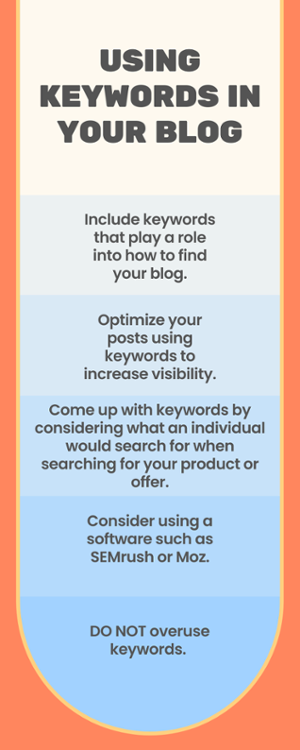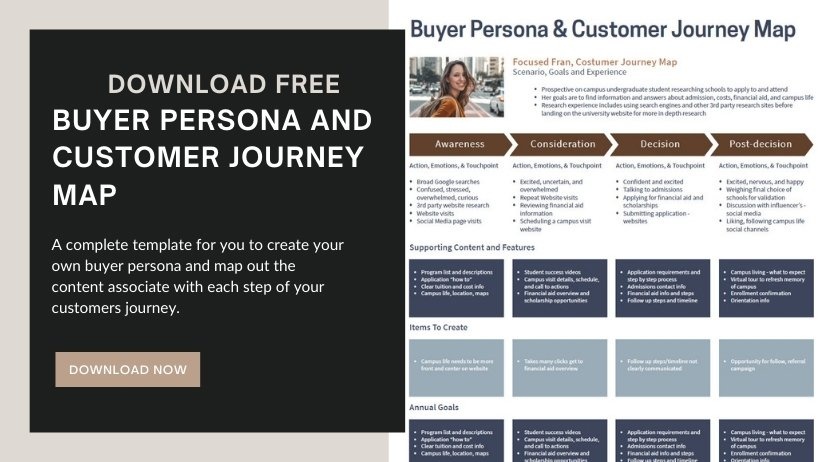[ad_1]
You’ve grabbed a cup of coffee, found a comfortable seat and opened your laptop. You have everything you need in front of you to write a blog, yet typing those first few words feels about as challenging as climbing Mt. Everest.
Writing a blog can be an effective inbound marketing tool that promotes visibility for your company online and helps boost business growth. It’s one of the most cost-effective tools you have at your disposal as a business owner. According to Hubspot, B2B companies that use blogs generate 67% more leads than those that don’t.
Yet writing a page filled with words and writing a blog that helps generate leads for your sales staff are two very different things. Effective blogs deliver targeted content to their audiences, provide advice and allow you to serve as an expert authority on a subject.
Creating a first blog post and maintaining that blog is not always easy. However, it can bring your company a significant return on investment while speaking to your ideal customers and helping them solve their problems.
But figuring out what to write in a blog is the first step to making it easier for prospective customers to find you.
Compelling Content
Let’s begin with the content itself – the types of topics you should and shouldn’t cover if your goal as a business is to attract quality leads for your sales staff.
The content you create should keep customers coming back for more. It should help potential customers with a problem that they have and should be compelling enough to convince them that the story you share is too good for them not to share with their network.
Customers are looking for solutions and if you provide and address those solutions in your blog, they are more likely to find you and reach out to you for help.
To better understand what kinds of problems your target audience has before you create a blog, you should develop a buyer persona. What is a buyer persona? A buyer persona is a semi-fictional representation of your ideal customer based on market research and real data about your existing customers. When developing your buyer persona, you should take into account information like:
- Customer demographics
- Behavior patterns
- Motivations
- Goals
Developing a buyer persona is extremely important in creating the right content that attracts the right visitors to your website.
As you come up with blog topics, focus on things like:
- What unique experiences make you a trusted expert?
- What problem will you solve for readers?
- Who are you speaking to?
- What are you passionate and knowledgeable about?
As you write, it’s critical to tell a good story. If you’ve been in business for any length of time, you have a lot of material to work with. Somewhere along the line, a customer has had a problem that you were able to solve. You can be guaranteed that there are other potential readers out there with the same problems.
The stories you share are among the best ways to let potential customers know that you understand their pain and you have a solution. Here are a few other tips that will help you draft your content:
- Write more conversationally – not academically
- Focus on what you can teach your audience – not a personal story and how it impacted you
- Begin with a clear, concise idea, but think about the bigger picture and how it impacts the customer
- Give your audience something to walk away with or a pathway to take further action (we’ll discuss this more below)
What you DON’T want to do is make common mistakes, such as avoid writing on topics that are relevant to a customer’s purchase decision. Readers aren’t interested in navigating a business blog that talks about your company (think: company newsletter). They are looking for educational content that addresses the concerns they are facing.
Formatting Issues To Consider
How you write a great blog post can be just as important as what you write in a blog. Formatting directly impacts how well your blog post performs in search engines. It can also play an important role in helping you organize your thoughts and present them to readers.
Keep in mind that if you’ve taken the time to write comprehensive content that offers value, the blog’s format can make a big difference in whether someone reads it or moves on to another article.
Here are a few simple changes or formatting ideas that can impact how well your blog performs and resonates with prospective customers:
- Use blog formats that perform well, such as lists, how-to’s and blogs that answer “what” or “why” questions.
- Incorporate subheads to identify important sections. Use H1, H2, H3 … tags appropriately
- Keep paragraphs short (fewer than four or five sentences).
- Include images to help break up the text and add value. Don’t forget to add appropriate alt text to each image.
- Use bullet points when possible (they are more visually appealing and can help readers locate quick pieces of valuable information).
- Bold the text of important points.
- Include internal-external links to other posts that you have created or to trusted sources (this helps establish you as a credible source of information).
A Pathway To Take Further Action
An additional item you will want to include in your blog is a Call to Action (CTA). A CTA draws attention to another resource provided by you to help readers solve their problems.
This resource is usually another piece of quality content you have produced as part of your marketing plan. Examples of this type of content include eBooks, checklists, access to masterclasses and white papers.
When readers click on the CTA, it will take them back to a dedicated page on your website where they can fill out contact information in order to receive the content offer. This allows you to gather their contact information for further follow-ups.
Keywords That Get Your Blog Found
As you are writing your blog, it’s important to include keywords, which play an integral role in how search engines find your blog.
When you optimize your posts using keywords or keyword phrases, you increase the visibility of your website to individuals who are entering those same keywords in search engines in an effort to find a product or service that you offer.
Google scans millions of sites looking for the best ones that meet your search criteria and will reward user-friendly sites that include relevant keywords and phrases with a higher ranking.
But how do you know which keywords you should use in your blog content? You can likely come up with some keywords on your own by considering what an individual would type into a search engine when searching for a product or service that you offer.
However, choosing the right keywords also often involves the help of keyword software such as SEMrush or Moz. These software options provide keywords that you should use in your content that will help it rank higher. The keywords they generate are based on keywords that have high monthly searches.
At the same time, it’s important NOT to overuse keywords. Search engines will consider you a “keyword stuffer,” meaning you will likely get bumped down in the search results and off the front page.
Optimization Tools That Google Loves
In addition to keywords, search engine optimization or SEO enhances your content and makes it more attractive to a search engine. Optimizing the keywords on your blogs is an important practice because you want to improve the number of people who see your blog and the quality of their visits to your site.
Optimizing your blog makes it easy for search engines to scan your blogs to better understand what they are about. Search engines can then deliver the most relevant results for the people who are looking for the information you are writing about.
In addition to keyword usage, other factors that help optimize your blog include:
- Social metrics, such as how often your blog is shared (so share it on social media, through email marketing, etc.)
- Mentions of your product or service on other platforms including social media sites
- Your content’s length, originality and readability (the text’s level of difficulty in comparison to what an audience may expect)
- The quantity and quality of the links within the text
- Your content’s relevance
When publishing your blog article, make sure that you include title tags and meta descriptions that are on point. The title tag is the HTML element that helps search engines understand what your blog is about, and the meta description provides a brief summary of your website.
Another optimization tool is backlinking, which is the process of creating a link from another website back to your website. When search engines rank sites, they use backlinks as a factor. That’s because when you have a backlink from a high-quality website, search engines believe that your content is more trustworthy.
Now what?
You’ve written a blog, now what? As we mentioned above, social media is an effective way to boost your blog traffic. One of the easiest ways to use social media is to make sure you regularly share your content on your channels and encourage others to “like” and “share” the content as well. Engage with users by replying to comments and sharing their content as well. This will boost your social media presence and therefore help your blog traffic.
Who your target is will determine what social media sites you use to share your blogs. LinkedIn tends to be more appropriate for industry-related topics, but Facebook or Instagram may be better if your blog centers around promoting your small business to the community.
If you’re now weighing whether you want to continue writing successful blogs for your company, that’s understandable. Blogs can be time-consuming to research and write, and as a business owner, time is precious.
Hiring freelance blog writers is an option, but if you plan to generate a high number of blogs each month, it may be more cost- and time-efficient for you to hire a full-time or even part-time content writer.
As a small business, you may not be in a position to hire a full-time staff writer. Blogging services can provide the best of both worlds by:
- Utilizing its own experienced writers, saving you the expense and time of adding to your own staff
- Perform keyword research and analysis for you to target what content topics should be written about
- Take care of any administrative duties associated with the blogs, including editing, prepping them for SEO and publishing them
- Create a network of links among your blogs to increase traffic back to your website
The best blogging services will also use their experience in your industry to identify your buyer persona and create an effective marketing plan around it … putting you on a course to consistently generate leads and grow your business.
[ad_2]
Source link


